|
I've always had a soft spot for actor Fred Ward. Blessed as he is with a growl of a voice and the rough-hewn features of a dock worker who moonlighted as a bare-knuckle boxer, he never seemed destined for superstar status. From his earliest days it seemed likely that he'd spend his film career as a character actor, providing tough guy support to a string of prettier leading players. But then again, who knows? In some ways the young Ward reminds me of an early career Charles Buchinsky, aka Charles Bronson, another weather-beaten face that spent years in support roles before offered the chance to carry a film. And there were some really choice roles in Ward's early career, notably confrontational National Guardsman Reece in Southern Comfort, Mercury astronaut Gus Grissom in The Right Stuff, and Meryl Streep's joke-telling nuclear plant co-worker in Silkwood.
Then in 1985 the unexpected happened and Ward landed a lead role in an action movie with secret agent overtones. Fred Ward as James Bond? Seriously? Well, not quite, but you're in the right ballpark. As producer Larry Spiegel explains in the extras on this disc, the intention was to create a blue collar Bond, one whose principal skill was his ability to dodge and disarm his enemy rather than shoot him or trap him in his own elaborate death machine. Intriguing, huh? Welcome to Remo Williams: The Adventure Begins.... I'll be coming back to that suggestive title later.
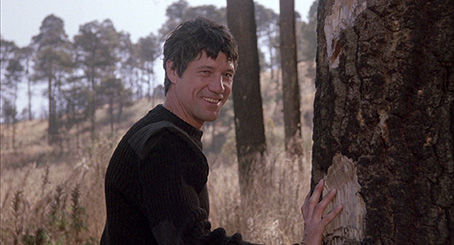
The titular Remo starts the film as patrol cop Samuel Makin, who is ambushed by some street hoods and trapped in his car when it's pushed into the drink. Supposedly dead and buried, he recovers to find himself in the care of military hard-ass Conn MacCleary (J.A. Preston) and computer expert Harold Smith (the lovely Wilford Brimley), the head of a small but secret organisation formed to investigate and take action against threats to national security. Having explained the setup to Remo, MacCleary introduces him to ageing Korean martial arts master Chiun (Joel Grey). Now when I say introduces, that's not strictly true. What he actually does is send Remo into Chiun's apartment with a handgun and orders to kill whoever dwells within. Remo tries his best, but Chiun easily outmanoeuvres him and repeatedly sends him careening to the floor. Asked to evaluate Remo's suitability for training in a very special kind of combat, Chiun is not impressed. "He move like a baboon with two club feet," he observes. "However, there is a feeble glint of promise in his eyes. I think I can do something with him." Chiun accepts Remo as a pupil and in the course of his intense training seriously improves the younger man's coordination and agility. He even teaches him how to dodge bullets and be so light on his feet that he can glide over the ground whilst running. What's the betting that will come in useful later? All of this is entertaining in the way those training scenes in The Karate Kid were the previous year, made all the more so by Ward's cocky self assurance and scowling glares when he falls on his arse. Not that I'm suggesting an influence here – these scenes, after all, were in the novel The Destroyer on which Remo Williams was based.
When MacCleary reappears to ask how the training is progressing, Chiun suggests our boy will be ready for action in approximately fifteen years. That's ahead of schedule, apparently. Unfortunately, MacCleary needs him right away to investigate dodgy defence contractor Charles Grove, a wealthy and immoral capitalist whose iffy dealings have also come to the attention of Major Rayner Fleming (Kate Mulgrew), a no-nonsense female army officer who is making her mark in a traditionally male world.
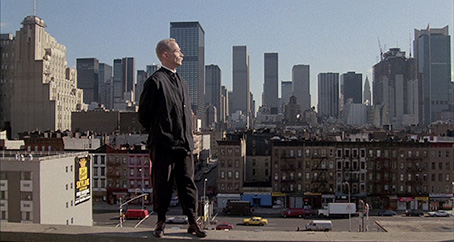
It's been a long time since I last saw Remo Williams, which was originally screened in the UK as Remo: Unarmed and Dangerous, a title I rather like and remembered fondly enough to initially wonder if Remo Williams: The Adventure Begins... was actually a different film. I certainly recall enjoying it, but not being excited enough by it to see it a second time during the many years that followed. Watching it again after so long a gap, it's actually easy to appreciate the cause of this ambivalence. Remo Williams is a great deal of fun, even more than I remember, but there's also something not quite... Ah, you see, I'm still not completely sure.
Ward certainly makes for a most engaging hero, and sending him into action before he's polished his skills gives him a vulnerability that made for a refreshing change in an era overpopulated with comically muscular and seemingly indestructible heroes. There's no Kryptonite threat for Remo – he can lose a fight simply because isn't fast or resourceful enough to outrun or successfully beat up his attackers. In action movie terms, however, this does tend to make him feel a tad underpowered. Ward is certainly in prime physical shape, but he lacks the speed and athleticism of the likes of Bruce Lee or Jackie Chan, and director Guy Hamilton – who cut his action teeth on Bond movies, including fan favourite Goldfinger – employs no visual or editing trickery to enhance Remo's skills. Indeed, Remo's fighting style is more a finessed form of rough-house brawling than a fully fledged martial art, one that you can't help thinking you could probably learn yourself. He's not faster than a speeding bullet, just able to anticipate when the gun will be fired and make the appropriate move beforehand, like a top class goalie in a World Cup penalty shoot-out.
This lack of superhero sheen is carried over into the set-pieces, which although ambitious and inventive, never feel as slick or spectacular as you sense they're trying to be, like brisk run-thoughs for scenes that will be expanded in scope and detail at a later date. The most eye-catching is without doubt a dodge-and-run chase on scaffolding surrounding the Statue of Liberty (which was being renovated at the time), which has that sometimes palpable sense of very real physical danger. Occasionally the camera angles feel restricted by the need to disguise the mix between shots filmed on the statue itself and those staged later on a partial replica that had been constructed in Mexico – when Remo is dodging attacks on the statue's torch hand, for example, the scene screams for wider shots that more clearly emphasise his lethal distance from the ground, something digital compositing would make all too easy to achieve today. Nonetheless, the two locations are seamlessly matched (full marks here to Hamilton's pre-planning and editor Mark Melnick), and in action terms this is probably the highlight of the film, one the somewhat scrappier climax cannot hope to compete with.*
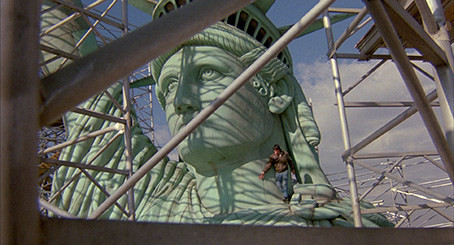
Some elements have inevitably dated, from the very 80s main theme in Craig Safan's otherwise solid score, to the strong female character who goes all girlie and dewy-eyed for the male hero at the end. What is likely to seem strangest from a modern perspective, however, is the casting of Joel Grey as Chiun. Now don't get me wrong, Grey is a superb actor and his performance here really is impeccably judged, nailing the accent without ever straying into parody and looking every inch an octogenarian Korean, thanks in no small part to Carl Fullerton's extraordinary Oscar-nominated make-up. But why, you may ask, was the role not simply played by a Korean actor? In the extra features, producers Larry Spiegel and Judy Goldstein assure us that they did indeed audition a number of Korean performers for the role but found none that were suitable. Grey was only approached after this process had faltered, and only agreed to play it if the role itself would be respectful to the Korean community. All of which sounds reasonable enough. But I couldn't help wondering what the response would have been had the filmmakers failed to find an Africa-American actor to play MacCleary and made up a white actor to play the role instead. That's not meant as a criticism – Grey's performance is too nicely pitched for that and Chiun's relationship with Remo is the heart of the film – it's just a thought on which to ponder, one made at a time when Korean cinema has made its own mark on the world.
But there's still much to enjoy here. From an early stage the film's tongue is firmly in its cheek, and this refusal to take itself too seriously, coupled with Remo's engagingly everyman nature, give Remo Williams its sometimes considerable charm. It certainly wears its absurdities with the cheeriest of grins – that the covert organisation to which Remo is recruited has adopted the acronym CURE is daffy enough (though at a time when even government agencies are media-savvy, it's perhaps not as unlikely as it once must have seemed), but the fact that it only seems to consist of one middle-aged computer whiz, one shady military officer and one ageing Korean martial arts expert places it firmly in comic-book territory. Chiun's addiction to a particularly sappy TV soap is both amusing in itself and foreshadows a key personality trait of one Gregory House MD, and in the tradition of showing a weapon in the first act that will be used in the last, it would take a genius to predict the hilarious use that Remo later makes of a diamond stud embedded in the tooth of a government stooge. And if you thought that fence-leaping dog in Tenebrae deserved its own show, then just wait until you clap your eyes on the guard dogs that chase Remo when he and MacCleary go on a night-time warehouse raid. An initially ferocious trio, they work like a team of canine ninjas to inventively bypass every barrier that Remo puts in their way. Never mind Remo Williams, these are the boys that CURE should be recruiting.
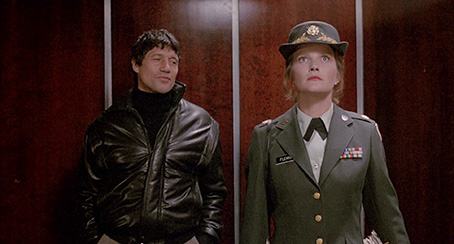
So what about that title? As it seems to suggest, the intention was that Remo Williams: The Adventure Begins... would be the first in a series of films featuring this blue collar James Bond, and with well over a hundred Destroyer books to draw on, the filmmakers were never going to be short of a storyline. But despite being made on what was the biggest budget of any Orion film to that date (a whopping $15 million – those were the days), Remo Williams met with mixed reviews and was a financial flop. There's an argument for suggesting that it was just too offbeat to set the box-office alight, a non-violent actioner released at a time when the success of such movies was generally gauged by the size of their explosions and their body count. As is so often the way, it was on video that the film finally found the audience it was looking for, although still not on the sort of scale that would convince studio funders to take a chance on a sequel. A second attempt to kick-start the series also fell at the starting gate, with the 1988 TV pilot Remo Williams: The Prophecy, starring Jeffrey Meek as Remo and Roddy McDowell as Chiun (what, still no Korean actor?), failing to spark enough interest to be developed into a series. Even this long after the event, producers Larry Spiegel and Judy Goldstein live in hope of getting that second film or a TV series off the ground. Personally I'd let it go and enjoy the film for what it is, a quirky, not wholly successful, but consistently good natured and enjoyable one-off with a solid cult following. I'd be happy enough with that.
Can Arrow do no wrong on their transfers? The HD master here was created by MGM and delivered by Hollywood Classics. Additional picture clean-up was performed at Deluxe Digital – EMEA, London under the supervision of James White for Arrow Films. And it looks terrific, a spotless, handsomely detailed transfer with a finely balanced contrast range and naturalistic colour. Unsurprisingly, perhaps, daytime exteriors shine the brightest, with Remo's rooftop training, Wonder Wheel dangling and Statue of Liberty adventure really impressing, but the darker scenes are also consistently clearly rendered. What really bowled me over was how well Carl Fullerton's makeup work on Joel Grey stands up to such crisp HD examination, even in close-up. We are assured that some minor picture and audio issues remain, in keeping with the condition of the materials used for the transfer, but you'll be pushed to spot them.
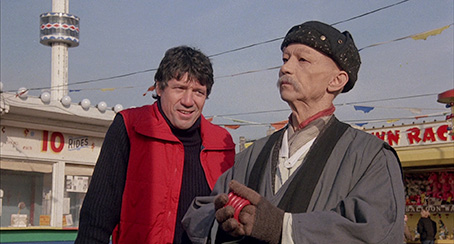
The disc sports a very clear Linear PCM 2.0 stereo track with a decent dynamic range that is especially kind to the sound effects and music score, which are livelier and richer than you might expect for a film from the 80s, particularly the impressively solid bass response.
In common with a number of recent releases of films from previous decades on independent labels, there is also an option to watch the film with only the music and sound effects enabled, which does emphasise how well they have been composed, recorded and mixed.
Commentary by Larry Spiegel and Judy Goldstein
A solid commentary by the film's two producers that is unsurprisingly based around their memories of the production. The pair cover a lot of ground, but rarely in the sort of detail you'd get from an enthusiastic director, the exception to this being when they discuss trying to get the TV series off the ground and why the film failed to perform at the box-office. There's plenty of interesting stuff here, including the aforementioned assurance that they searched for a Korean actor before approaching Joel Grey for the role of Chiun, how they came to the books and to the movie, the casting decisions, and the quality of the craftsmanship and facilities in Mexico. They are occasionally prompted from somewhere in the background by Arrow regular Callum Waddell, who does ask about a continuity point that left me puzzled, when Remo wraps a rope around the neck of a bad guy and tosses him out of a scaffold elevator, only for the next shot to show him dangling by his ankle (the response is not quite as revealing as I'd hoped). One of my favourite stories, and one the producers have told before, tells of actors auditioning for the role of Remo who swore they'd been training for years in Sinanju, a martial art invented for the books and the film.
Remo, Rambo, Reagan and Reds (66:32)
A solid, entertaining and perceptive look at the 80s American action movie cycle, which is explored primarily through the work of its more prominent stars and films. The narrative is driven by interviews with writers on 80s action cinema and those who worked in it, including Commando director Mark L. Lester, Angel producer Donald P. Borchers and American Ninja director Sam Firstenberg. Critic and film historian Howard S. Berger provides some very level-headed analysis of particular films and stars and the cycle's rise and fall, but it's Professor Susan Jeffords, author of the book Hard Bodies: Hollywood Masculinity in the Reagan Era, who really gets under the subtextual and thematic skin of these films. This is particularly evident in her analysis of the cycle's homoerotic overtones, something that Asian cinema guru Bey Logan admits has always flown over his head until explained to him by others. Another fine documentary from Callum Waddell's High Rising Productions, despite some minor, low light-induced focus issues on the Bey Logan interview.
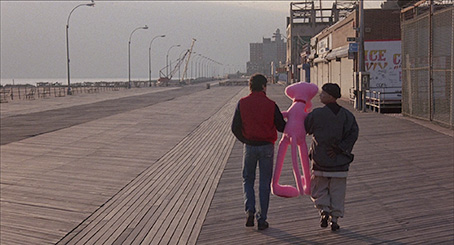
When East Meets West (10:00)
Actor Joel Grey recalls being approached to play Chiun and the reasons for his initial resistance to taking the role, then touches on the insanely early make-up calls, shopping for objects to personally furnish Chiun's apartment, working with Fred Ward, and more. His tongue-in-cheek response to being asked how the walking on water gag was done is delivered with the straightest of faces, and contrary to claims make by the producers on the commentary track, he states that there was a "brouhaha" over the casting of a Caucasian actor in a Korean role.
Changing Faces (10:54)
Make-up man Carl Fullerton recalls landing the job on the film, taking life casts of Koreans on which to base his work, the influence of make-up guru Dick Smith on his craft, Grey sleeping through his makeup application sessions, the particular problems created by having to create wafer thin eyelid folds, and more. He also reiterates the claim that Grey was cast because of he had a particular quality that the producers were looking for and did not find in the Asian actors they interviewed.
Notes for a Nobelman (13:28)
Composer Craig Safan discusses creating what he considers to be his most complex score, combining orchestral, synthesiser and traditional Korean elements, researching authentic Korean music and conducting Korean musicians, working and drinking with director Guy Hamilton and initial unavailability of the soundtrack CD.
Theatrical Trailer (2:55)
A well edited trailer with a borrowed score.
Booklet
The centrepiece of this typically fine Arrow booklet are two excellent essays. The first, by Barry Forshaw, focuses on the Destroyer novels on which the film was based and is a useful intro for those of us who've yet to read any of the books. The second, by George Turner, is a reproduction of a 1985 article from American Cinematographer and is unsurprisingly focused on the cinematography and is built around an interview with DoP Andrew Laszlo (also the lensman on 70s favourite The Warriors). Also included are the main credits for the film, brief notes on the transfer and some quality stills.
An offbeat and almost genteel action film released at a time when slick, loud and violent ruled the roost, Remo Williams: The Adventure Begins... remains a curious but immensely likeable beast. It's not hard to see why it didn't take off as a franchise, but it's nonetheless found a happy home in the world of 80s cult film fandom, and has been given handsome treatment on this splendid Arrow Blu-ray. If you love the film, you absolutely have to have this disc.
* In an interview on www.shatterhand007.com screenwriter Christopher Wood said that he had "written a slam bang action finale that was cut for budgetary reasons," and suggested that this contributed to the film's poor box-office performance.
|